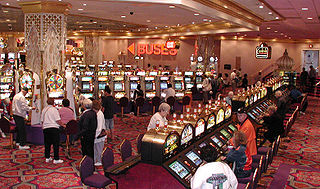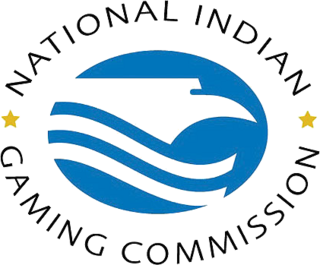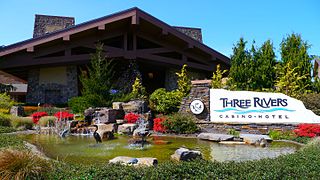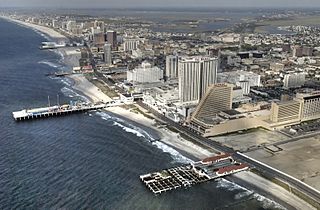
Native American gaming comprises casinos, bingo halls, and other gambling operations on Indian reservations or other tribal lands in the United States. Because these areas have tribal sovereignty, states have limited ability to forbid gambling there, as codified by the Indian Gaming Regulatory Act of 1988. As of 2011, there were 460 gambling operations run by 240 tribes, with a total annual revenue of $27 billion.

The Alabama or Alibamu are a Southeastern culture people of Native Americans, originally from Alabama. They were members of the Muscogee Creek Confederacy, a loose trade and military organization of autonomous towns; their home lands were on the upper Alabama River.

The Indian Gaming Regulatory Act is a 1988 United States federal law that establishes the jurisdictional framework that governs Indian gaming. There was no federal gaming structure before this act. The stated purposes of the act include providing a legislative basis for the operation/regulation of Indian gaming, protecting gaming as a means of generating revenue for the tribes, encouraging economic development of these tribes, and protecting the enterprises from negative influences. The law established the National Indian Gaming Commission and gave it a regulatory mandate. The law also delegated new authority to the U.S. Department of the Interior and created new federal offenses, giving the U.S. Department of Justice authority to prosecute them.

In the United States, gambling is subject to a variety of legal restrictions. In 2008, gambling activities generated gross revenues of $92.27 billion in the United States.
A gaming control board (GCB), also called by various names including gambling control board, casino control board, gambling board, and gaming commission, is a government agency charged with regulating casino and other types of gaming in a defined geographical area, usually a state, and of enforcing gaming law in general.

The National Indian Gaming Commission is a United States federal regulatory agency within the Department of the Interior. Congress established the agency pursuant to the Indian Gaming Regulatory Act in 1988.

The California Bureau of Gambling Control is a regulatory agency that is part of the California Department of Justice. It regulates legal gambling activities in California to ensure that gambling is conducted honestly, competitively, and free from criminal and corruptive elements. It is one of two agencies in California regulating gambling, along with the California Gambling Control Commission.
Tribal-state compacts are declared necessary for any Class III gaming on Indian reservations under the Indian Gaming Regulatory Act of 1988 (IGRA). They were designed to allow tribal and state governments to come to a "business" agreement. A compact can be thought of as "negotiated agreement between two political entities that resolves questions of overlapping jurisdictional responsibilities Compacts affect the delicate power balance between states, federal, and tribal governments. It is these forms that have been a major source of controversy surrounding Indian gaming. Thus, it is understandable that the IGRA provides very detailed instructions for how states and tribes can make compacts cooperatively and also details the instructions for how the federal government can regulate such agreements.
California v. Cabazon Band of Mission Indians, 480 U.S. 202 (1987), was a United States Supreme Court case involving the development of Native American gaming. The Supreme Court's decision effectively overturned the existing laws restricting gaming/gambling on U.S. Indian reservations.

Gambling in Oregon relates to the laws, regulations, and authorized forms of gambling.
The impact of Native American gaming depends on the tribe and its location. In the 1970s, various tribes took unprecedented action to initiate gaming enterprises. In this groundbreaking revitalization of the Native American economy, they created a series of legal struggles between the federal, state, and tribal governments. Native American gaming has grown from bingo parlors to high-stakes gaming, and is deeply controversial. Disputes include tribal sovereignty, negative impact of gaming, and a loss of Native American culture. The Indian Gaming Regulatory Act was passed in 1988 to secure collaboration between the states and tribes and also for the federal government to oversee gaming operations. Gaming is extremely lucrative for several tribes, but it has also been unsuccessful in some instances.

Gambling in New Jersey includes casino gambling in Atlantic City, the New Jersey Lottery, horse racing, off-track betting, charity gambling, amusement games, and social gambling. New Jersey's gambling laws are among the least restrictive in the United States. In 2013, the state began to allow in-state online gambling. Five years later, the state won a lawsuit that dismantled Nevada's monopoly on legal sports betting.
Legal forms of gambling in the U.S. state of North Carolina include the North Carolina Education Lottery, three Indian casinos, charitable bingo and raffles, and low-stakes "beach bingo". North Carolina has long resisted expansion of gambling, owing to its conservative Bible Belt culture.
Legal forms of gambling in the U.S. state of Texas include the Texas Lottery; parimutuel wagering on horse and greyhound racing; limited charitable bingo, limited charitable raffles, and three Indian casinos. Other forms of gambling are illegal in Texas.
Legal forms of gambling in the U.S. state of Massachusetts include casinos, sports betting, parimutuel wagering on horse racing, the Massachusetts Lottery, and charitable gaming. The Massachusetts Gaming Commission regulates commercial operations under state jurisdiction.

The Michigan Gaming Control Board (MGCB) is a gaming control board in Michigan that provides oversight of the state's gaming industry, which was founded and authorized by statewide voting in November 1996.

Legal forms of gambling in the U.S. state of California include cardrooms, Indian casinos, the California State Lottery, parimutuel wagering on horse racing, and charitable gaming. Commercial casino-style gaming is prohibited.
Legal forms of gambling in the U.S. state of Maine include parimutuel wagering on horse races, the Maine Lottery, two casinos, and charitable gaming.
Legal forms of gambling in the U.S. state of Connecticut include two Indian casinos, parimutuel wagering, charitable gaming, the Connecticut Lottery, and sports betting.
Legal forms of gambling in the U.S. state of New Hampshire include the New Hampshire Lottery, sports betting, parimutuel wagering, and charitable gaming. The state's Gaming Regulatory Oversight Authority (GROA) is part of the New Hampshire Lottery Commission, which also maintains an Investigative & Compliance Division.











